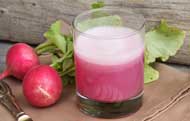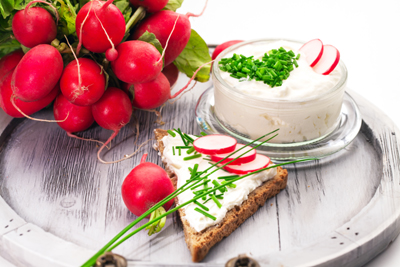





1. Radish Facts
2. Types of Radish
3. Radish Nutritional value
4. Radish Health Benefits
The radish (Raphanus sativus) is a flowering plant in the mustard family, Brassicaceae. Its large taproot is commonly used as a root vegetable.
History and Origin
Radishes originated in Southeast Asia, likely China, and spread to the Mediterranean and Europe thousands of years ago, with wild forms still existing there today. They are mentioned in ancient Egyptian records and were prized by the Greeks, who crafted golden radishes as offerings to Apollo. The Romans later introduced them to Britain, and by the 16th century, various types, including larger white varieties, were being cultivated in Europe, with smaller varieties emerging around the same time.
- • Cherry Belle
- • Daikon
- • French Breakfast
- • Watermelon
- • Pink Beauty
- • Scarlet Globe
- • White Icicle
- • Black Spanish
- • Mixed colours
Australian radish varieties include common types like Cherry Bell and Daikon, as well as colourful options such as Watermelon (pink and white inside) and Pink Beauty. Many are grown year-round in a mix of red, white, and purple, and other popular varieties available include the French Breakfast, and Scarlet Globe.
Red and colourful varieties
Cherry Bell: A common, classic red radish.
Pink Beauty: A pink variety that is less peppery than many other red types.
Watermelon: A visually striking variety that is green on the outside and pink on the inside.
Mixed colours: Varieties that combine red, black, white, purple, and rose-coloured radishes.
Scarlet Globe: A bright red, round radish with a mild flavour.
White and large varieties
Daikon: A large, white, and cylindrical variety with a milder flavour. It is also known as Mooli and is popular in Asian cooking.
White Icicle: A long, white, and heat-resistant variety that is often used for pickling or in salads.
Other varieties
French Breakfast: An oblong-shaped radish with a red tip and a white end.
Black Spanish: A variety with black skin and crisp white flesh.
Vegetables " Radish "
Nutritional value per 100 g
Radishs, raw
|
Nutrient (Proximity)
|
Unit
|
Value
|
Daily Value %
|
|
Energy
|
kcal
|
16 | 0.8% |
|
Protein
|
g
|
0.68 | 1.3% |
|
Total lipid (fat)
|
g
|
0.10 | 0.1% |
|
Carbohydrate, by difference
|
g
|
3.40 | 1.2% |
|
Fiber, total dietary
|
g
|
1.6 | 5.7% |
|
Sugars, total
|
g
|
1.86
|
|
|
Minerals
|
|||
|
Calcium, Ca
|
mg
|
25 | 1.9% |
|
Iron, Fe
|
mg
|
0.34 | 1.8% |
|
Magnesium, Mg
|
mg
|
10 | 2.3% |
|
Phosphorus, P
|
mg
|
20 | 1.6% |
|
Potassium, K
|
mg
|
233 | 4.9% |
|
Sodium, Na
|
mg
|
39 | 1.6% |
|
Zinc, Zn
|
mg
|
0.28 | 2.5% |
|
Copper, Cu
|
mg
|
0.050 | 5.5% |
|
Manganese, Mn
|
mg
|
0.069 | 3% |
|
Selenium, Se
|
mcg
|
0.6 | 1% |
|
Vitamins
|
|||
|
Vitamin C, total ascorbic acid
|
mg
|
14.8 | 16.4% |
|
Thiamin (B-1)
|
mg
|
0.012 | 1% |
|
Riboflavin (B-2)
|
mg
|
0.039 | 3% |
|
Niacin (B-3)
|
mg
|
0.254 | 1.5% |
|
Pantothenic acid (B-5)
|
mg
|
0.165 | 3.3% |
|
Vitamin B-6
|
mg
|
0.071 | 4.1% |
|
Folate, total (B-9)
|
mcg
|
25 | 6.2% |
|
Vitamin B-12
|
mcg
|
0.00
|
|
|
Vitamin A, RAE
|
mcg
|
0 | |
|
Vitamin E (alpha-tocopherol)
|
mg
|
0.00 | |
|
Vitamin D (D2 + D3)
|
mcg
|
0
|
|
|
Vitamin K (phylloquinone)
|
mcg
|
1.3 | 1% |
|
Lipids
|
|||
|
Saturated Fatty Acids
|
g
|
0.032
|
0.1% |
|
Monounsaturated Fatty Acids
|
g
|
0.017
|
|
|
Polyunsaturated Fatty Acids
|
g
|
0.048
|
|
|
Trans Fatty Acids
|
g
|
0.000
|
|
|
Carotenoids
|
|||
|
Beta-Carotene
|
mcg
|
4
|
|
|
Alpha-Carotene
|
mcg
|
||
|
Beta-Cryptoxanthin
|
mcg
|
||
|
Lutein + zeaxanthin
|
mcg
|
10
|
|

|
Reference Values are based on a 2,000 Calorie Intake, for Adults and Children 4 or More Years of Age. Your daily values may be higher or lower depending on your calorie needs.
|
|
Percentages are roughly approximated using (RDA) Recommended Dietary Allowances for adults. Source: USDA United States Department of Agriculture
|
|
Reference Values for Nutrition - FDA U.S. Food and Drug Administration
|
Radish Nutritional Value
Radishes offer numerous health benefits, including a good source of antioxidants like Vitamin C, which protect cells from damage. They also have potential anticancer properties due to compounds like isothiocyanates and glucosinolates, which may help fight tumour development. Additionally, they support heart health by helping to lower blood pressure and protect against heart disease, and aid in digestion due to their fiber content.
- ANTI-CANCER
Properties Many studies have shown that radish leaves have antioxidant properties. These antioxidants seem to help protect you against liver, colon, breast, cervical, prostate and lung cancers. Another study showed that the leaf extract stopped the growth of a certain type of breast cancer cell. - RICH IN ANTIOXIDANTS
Radishes are rich in various antioxidants, including vitamin C, phenolic compounds (like catechin, pyrogallol, and vanillic acid), flavonoids, and glucosinolates. These compounds help protect the body's cells from damage caused by free radicals, reduce inflammation, and may lower the risk of chronic diseases such as certain cancers. The edible root, leaves, sprouts, and seeds all contain these beneficial antioxidants. - SUPPORTS DIGESTIVE HEALTH
Radishes support digestive health by providing dietary fiber, which aids in regular bowel movements and prevents constipation. They also contain compounds like glucosinolates and pectins that can improve gut barrier integrity, support beneficial gut bacteria, and have pre-biotic effects. Additionally, radishes have been used in folk medicine to relieve indigestion and bloating. - BLOOD SUGAR CONTROL
Radishes may help with blood sugar control by containing compounds like glucosinolates and isothiocyanates, which can improve insulin sensitivity and enhance glucose uptake. Antioxidants such as coenzyme Q10 and adiponectin also contribute to their potential anti-diabetic effects. While early studies in animals show promise, more research is needed to confirm these benefits in humans. - LIVER HEALTH
Radishes support liver health by acting as powerful detoxifiers, with studies showing they can protect against liver injury by reducing oxidative stress and apoptosis. Rich in antioxidants like anthocyanins and containing beneficial compounds, radishes aid the liver in detoxifying the body and may help mitigate conditions like jaundice. However, it's important to use radishes cautiously if you have gallstones, as they can increase bile flow, and consult a doctor if you have any underlying health conditions or are on medication.

- HEART HEALTH
Radishes support heart health by providing antioxidants and minerals like potassium, which help regulate blood pressure and improve circulation. They contain flavonoids like anthocyanins, which reduce inflammation and protect against oxidative damage to blood vessels, lowering the risk of heart disease, atherosclerosis, and clots. The compounds in radishes also contribute to healthy endothelial function and can lower levels of "bad" cholesterol (LDL). - ANTIFUNGAL PROPERTIES
Radishes exhibit antifungal properties due to a natural defence protein called RsAFP2, found in radish seeds. Studies show RsAFP2 can kill the cells of Candida albicans, a common fungus that causes infections like thrush and yeast infections. The protein induces apoptosis (programmed cell death) by activating caspases, or caspase-like enzymes, within the fungus, offering a natural way to combat certain fungal infections by inhibiting their growth. - HYDRATION AND SKIN HEALTH
Radishes support skin hydration and health by providing moisture from their high-water content and nutrients like Vitamin C, which promotes collagen production and skin firmness. Radishes also contain zinc, phosphorus, and Vitamin B6 that combat dryness and acne, while antioxidants and fatty acids in radish seed oil can protect against environmental damage and aging. - WEIGHT MANAGEMENT
Radishes aid weight management by being low-calorie, high-water, and rich in fiber, which promotes fullness and reduces overall calorie intake. Their high fiber content also supports stable blood sugar, aids digestion, and can lower cholesterol, contributing to a healthy metabolism. Studies in mice even suggest that radish extracts may have anti-obesity effects. - ANTI-INFLAMMATORY EFFECTS
Radishes exhibit anti-inflammatory effects due to compounds like glucosinolates and anthocyanins, which reduce oxidative stress and inhibit inflammatory signalling pathways. These properties can help protect against diseases such as colitis, kidney disease, and cardiovascular issues, and the effects are observed in radish roots, sprouts, and greens.
References
Nutrient Database - USDA (United States Department of Agriculture)
Reference Values for Nutrition - FDA U.S. Food and Drug Administration
Anti-Cancer - Properties Many studies have shown that radish leaves have antioxidant properties. These antioxidants seem to help protect you against liver, colon, breast, cervical, prostate and lung cancers. Another study showed that the leaf extract stopped the growth of a certain type of breast cancer cell.
Rich in Antioxidants - Radishes are rich in various antioxidants, including vitamin C, phenolic compounds (like catechin, pyrogallol, and vanillic acid), flavonoids, and glucosinolates. These compounds help protect the body's cells from damage caused by free radicals, reduce inflammation, and may lower the risk of chronic diseases such as certain cancers. The edible root, leaves, sprouts, and seeds all contain these beneficial antioxidants.
Supports Digestive Health - Radishes support digestive health by providing dietary fiber, which aids in regular bowel movements and prevents constipation. They also contain compounds like glucosinolates and pectins that can improve gut barrier integrity, support beneficial gut bacteria, and have pre-biotic effects. Additionally, radishes have been used in folk medicine to relieve indigestion and bloating.
Heart Health - Radishes support heart health by providing antioxidants and minerals like potassium, which help regulate blood pressure and improve circulation. They contain flavonoids like anthocyanins, which reduce inflammation and protect against oxidative damage to blood vessels, lowering the risk of heart disease, atherosclerosis, and clots. The compounds in radishes also contribute to healthy endothelial function and can lower levels of "bad" cholesterol (LDL).
Blood Sugar Control - Radishes may help with blood sugar control by containing compounds like glucosinolates and isothiocyanates, which can improve insulin sensitivity and enhance glucose uptake. Antioxidants such as coenzyme Q10 and adiponectin also contribute to their potential anti-diabetic effects. While early studies in animals show promise, more research is needed to confirm these benefits in humans.
Liver Health - Radishes support liver health by acting as powerful detoxifiers, with studies showing they can protect against liver injury by reducing oxidative stress and apoptosis. Rich in antioxidants like anthocyanins and containing beneficial compounds, radishes aid the liver in detoxifying the body and may help mitigate conditions like jaundice. However, it's important to use radishes cautiously if you have gallstones, as they can increase bile flow, and consult a doctor if you have any underlying health conditions or are on medication.
Antifungal Properties - Radishes exhibit antifungal properties due to a natural defence protein called RsAFP2 (Raphanus sativus antifungal protein 2), found in radish seeds. Studies show RsAFP2 can kill the cells of Candida albicans, a common fungus that causes infections like thrush and yeast infections. The protein induces apoptosis (programmed cell death) by activating caspases, or caspase-like enzymes, within the fungus, offering a natural way to combat certain fungal infections by inhibiting their growth.
Hydration and Skin Health - Radishes support skin hydration and health by providing moisture from their high-water content and nutrients like Vitamin C, which promotes collagen production and skin firmness. Radishes also contain zinc, phosphorus, and Vitamin B6 that combat dryness and acne, while antioxidants and fatty acids in radish seed oil can protect against environmental damage and aging.
Weight Management - Radishes aid weight management by being low-calorie, high-water, and rich in fiber, which promotes fullness and reduces overall calorie intake. Their high fiber content also supports stable blood sugar, aids digestion, and can lower cholesterol, contributing to a healthy metabolism. Studies in mice even suggest that radish extracts may have anti-obesity effects.
Anti-inflammatory Effects - Radishes exhibit anti-inflammatory effects due to compounds like glucosinolates and anthocyanins, which reduce oxidative stress and inhibit inflammatory signalling pathways. These properties can help protect against diseases such as colitis, kidney disease, and cardiovascular issues, and the effects are observed in radish roots, sprouts, and greens.
